Israeli forces killed another Hamas commander today in their second strike on Gaza's Jabalia refugee camp in two days, the military said, as the first group of civilian evacuees from the besieged enclave crossed into Egypt.
Pressing an offensive against Hamas militants, Israel again bombed densely populated Gaza from land, sea and air in its campaign to wipe out the Islamist group after its deadly cross-border rampage into southern Israel on 7 October.
Palestinians sifted through rubble in a desperate hunt for trapped victims after Israel's strike on Jabalia, Gaza's largest refugee camp.
"It is a massacre," said one witness of the strike.
The Israeli military said its fighter jets struck a Hamas command and control complex in Jabalia "based on precise intelligence," killing the head of the Islamist group's anti-tank missile unit Muhammad A'sar.
"Hamas deliberately builds its terror infrastructure under, around and within civilian buildings, intentionally endangering Gazan civilians," an Israeli statement said.
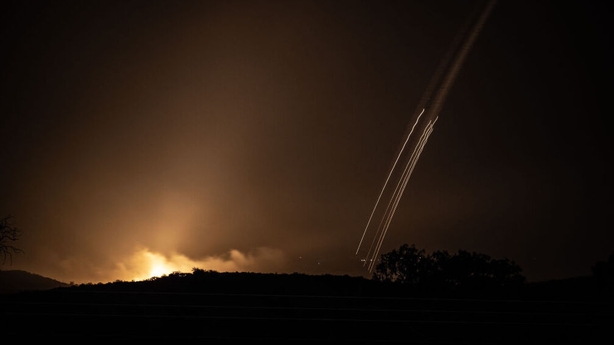
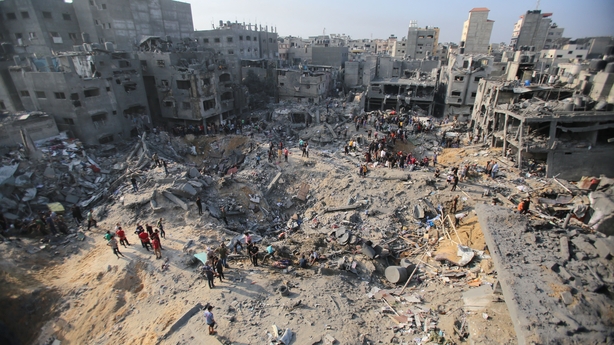
United Nations human rights officials said the operation could be a war crime.
"Given the high number of civilian casualties and the scale of destruction following Israeli air strikes on Jabalia refugee camp, we have serious concerns that these are disproportionate attacks that could amount to war crimes," the UN High Commissioner for Human Rights wrote on social media site X.
There were no immediate figures from Gaza authorities on casualties from the explosion at the camp today. Palestinian health officials said the first Israeli airstrike yesterday killed about 50 people and wounded 150.
Israel said yesterday's strike killed Ibrahim Biari, who it described as a ringleader of the 7 October attack on Israel.
US Secretary of State Antony Blinken will travel to Israel and Jordan on Friday, the State Department said.
He will meet Israeli Prime Minister Benjamin Netanyahu for an update on Israel's military objectives, it said.
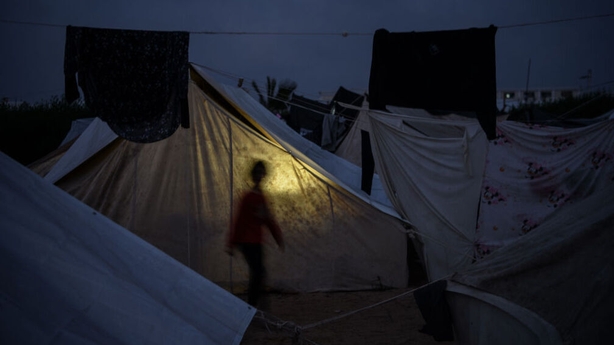
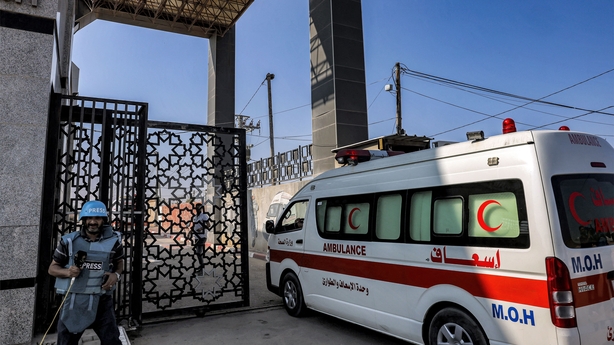
Dr Fathi Abu al-Hassan, a US passport holder waiting to cross into Egypt, described hellish conditions inside Gaza without water, food or shelter.
"We open our eyes on dead people and we close our eyes on dead people," he said while waiting to cross into Egypt.
"If this happened in any other country...even in the desert, (people) will combine together to (help) us," he said.
People evacuated to Egypt, trapped in Gaza since war began on 7 October, included passport holders from Australia, Austria, Bulgaria, the Czech Republic, Finland, Indonesia, Italy, Japan, Jordan, the UK and the US
They were driven through the Rafah border crossing and underwent security checks, officials said.
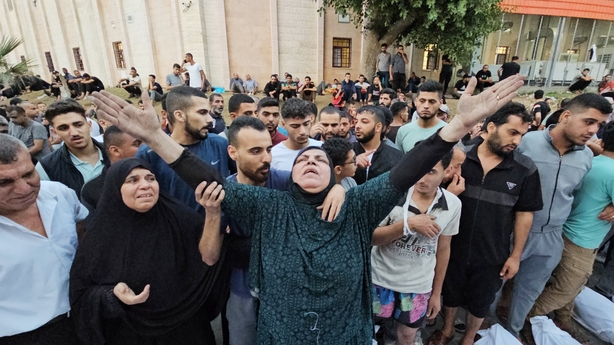
Today, at least 320 foreign passport holders on an initial list of 500 as well as dozens of severely injured Gazans left, Egyptian sources and a Palestinian official said, under a deal between Egypt, Israel and Hamas.
At least 49 medical evacuees arrived in Egypt, the governor of Egypt's North Sinai province told reporters later.
Nahed Abu Taeema, director of Gaza's Nasser Hospital, told Reuters that the evacuees would include 19 critically injured patients from his hospital, including children, who require advanced surgeries.
Some 1,000 Palestinian children from Gaza were being offered treatment at hospitals in the UAE, accompanied by their families, the UAE state-run news agency WAM said.
Gaza border officials said the frontier would reopen tomorrow so more foreign passport holders could exit.
A diplomatic source briefed on Egyptian plans said some 7,500 foreign passport holders would be evacuated from Gaza over about two weeks.
Read More:
No US troops will be placed in Gaza in peacekeeping role - White House
Israel reports attacking Hamas inside Gaza tunnels
Gaza now a 'graveyard' for thousands of children - UN
Fierce clashes in Gaza as Israel expands offensive
Israel sent ground forces into Hamas-ruled Gaza late last week after weeks of air and artillery strikes to retaliate for the surprise Hamas attack in which Israel says 1,400 people, mostly civilians, were killed and 240 were taken hostage.
The Gaza health ministry says at least 8,796 Palestinians in the narrow coastal enclave, including 3,648 children, have been killed by Israeli strikes since 7 October.
The Israeli military said one soldier was killed in Gaza today on top of 15 yesterday.
Hamas rocket fire persisted with warning sirens in southern Israeli communities as well as the Mediterranean port cities of Ashkelon and Ashdod.
"We are in a tough war," Mr Netanyahu said. "I promise to all citizens of Israel: We will get the job done. We will press ahead until victory."
White House national security spokesperson John Kirby said today that Washington did not believe Hamas could be involved in governing Gaza when the war is over.
Despite the rising civilian death toll in Gaza, Mr Kirby also said the US did not believe now was the time for a general ceasefire, but humanitarian pauses in hostilities were necessary.
Hospitals struggled to cope as shortages of fuel forced shutdowns. Israel has refused to let humanitarian convoys bring fuel into the shattered enclave, citing concern that Hamas fighters would divert it for military purposes.
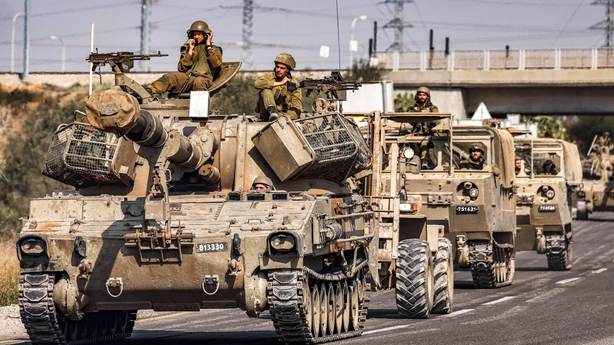
Tánaiste says humanitarian ceasefire in Gaza urgently needed
Tánaiste and Minister for Foreign Affairs Micheál Martin said that a humanitarian ceasefire in Gaza is urgently needed.
In a statement, he said that he was shocked by the number of casualties following the bombing of the Jabalya refugee camp yesterday.
Mr Martin said that Israel's right to defend itself "must be within the parameters of International Humanitarian Law.
"This means that the principles of distinction, necessity, proportionality and precaution must be upheld in the conduct of hostilities and that civilians must be protected."
The Tánaiste said: "With the unfolding tragedy in Gaza, the European Union has been calling since last week for humanitarian corridors and pauses for humanitarian needs.
"We now urgently need a humanitarian ceasefire and a significant scaling up of humanitarian access to get vital supplies to civilians."
In Washington, a group of anti-war protesters raised red-stained hands to interrupt a hearing in Congress on providing more aid to Israel.
They shouted slogans including, "Ceasefire now!" "Protect the children of Gaza!" and "Stop funding genocide." Capitol police removed them from the room.
Power generators in Al Shifa Medical complex and the Indonesian Hospital in Gaza will run out of fuel in a few hours, Ashraf Al-Qidra, spokesperson for the health ministry in Gaza said. He called on petrol station owners in Gaza to urgently feed the two hospitals with fuel if possible.
After the attack on Jabalia, dozens of bodies lay shrouded in white, lined up against the side of the Indonesian Hospital, footage obtained by Reuters showed.
Juggling dwindling supplies of medicines, power cuts and air or artillery strikes that have shaken hospital buildings, surgeons in Gaza have worked night and day trying to save a constant stream of patients.
"We take it an hour at a time because we don't know when we will be receiving patients. Several times we've had to set up surgical spaces in the corridors and even sometimes in the hospital waiting areas," Dr Mohammed al-Run said.
Hamas has told mediators it will soon release some of the 200 or so foreign captives it had taken during the attack on Israel, Abu Ubaida, the spokesperson of the group's armed wing, al-Qassam Brigades, said in a video on the Telegram app.
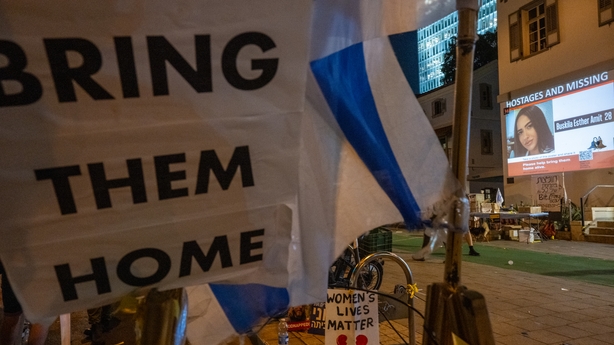
He gave no further details on the number of captives or their nationalities.
Meanwhile, Israeli families of victims of the 7 October attack appealed to the International Criminal Court to order an investigation into the killings and abductions. Israel is not a member of the Hague-based court and refuses to recognise its jurisdiction.
The United States has made "real progress" in the last few hours in negotiations to secure a safe passage for Americans and other foreign nationals who wish to leave Gaza, US State Department spokesperson Matthew Miller said.
US Secretary of State Antony Blinken will visit Israel on Friday for meetings with members of the government and then make other stops in the region, the department said.
Yesterday, Mr Blinken said the US and other countries were looking at "a variety of possible permutations" for the future of Gaza if Hamas militants are removed from control.
Israel has vowed to annihilate Hamas after several inconclusive wars dating back to the militant group's 2007 takeover of Gaza.
Mr Netanyahu dismissed international calls for a "humanitarian pause" in fighting to enable emergency aid deliveries to civilians suffering from critical shortages of food, medicine, drinking water and fuel.
Bolivia severs ties with Israel, others recall envoys over Gaza
Meanwhile, Bolivia has said it had broken diplomatic ties with Israel because of its attacks on Gaza, while its neighbours Colombia and Chile recalled their ambassadors for consultations.
The three countries called for a ceasefire, with Bolivia and Chile pushing for the passage of humanitarian aid into the zone and accusing Israel of violating international law.
Colombian President Gustavo Petro called the attacks a "massacre of the Palestinian people" in a post on the social media network X.
Israel's foreign ministry did not immediately respond to a request for comment.
Other Latin American countries, such as Mexico and Brazil, have also called for a ceasefire.
Bolivia is among the first countries to actively break diplomatic relations with Israel over its war in Gaza.
Bolivia cut diplomatic ties with Israel in 2009 under the government of leftist President Evo Morales, also in protest against Israel's actions in Gaza.
In 2020, the government of right-wing interim President Jeanine Anez reestablished ties.
"We reject the war crimes being committed in Gaza. We support international initiatives to guarantee humanitarian aid, in compliance with international law," Bolivian President Arce said on social media on Monday.
